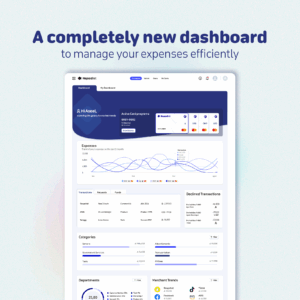
The financial landscape is rapidly evolving with technological advancements, and in 2025, small and medium-sized enterprises (SMEs) must secure a position in the accelerating wave of progress. To remain competitive, these businesses must embrace technological transformation, which equips them with the tools to compete and grow in an environment marked by constant change.
At Nqoodlet, we are transforming how SMEs manage their financial resources. Through our advanced tools and mission to simplify expense management, we empower SMEs to thrive. We recognize that sound financial management lies at the heart of sustainable growth for SMEs. In this article, we outline 5 critical areas your company should prioritize to enhance its financial operations in 2025
1. Analyze Your Company’s Spending Patterns
In 2025, understanding where your money goes will be more vital than ever. Tracking spending patterns goes beyond knowing the amount spent, it’s about understanding the context and purpose behind each expenditure. This insight helps identify inefficiencies, reduce waste, and optimize resource allocation.
Adopt expense management tools that provide real-time tracking of employee spending. These tools often include features like categorizing expenses, tracking budgets, and generating detailed reports. With these insights, you can make informed decisions based on accurate data.
Learn about Nqoodlet solutions to manage your company’s expenses effectively here
For example, if you find a significant portion of your budget allocated to office supplies, consider negotiating better deals with vendors or exploring cost-efficient alternatives. Similarly, a spike in travel expenses might signal the need to revisit travel policies or explore remote work options.
2. The Necessity of Financial Automation
Automation is poised to revolutionize financial management. In 2025, automating financial processes will become essential for SMEs aiming to streamline operations, reduce errors, and dedicate more time to strategic tasks.
Automation tools can handle repetitive tasks like invoicing, expense reporting, payroll processing, and account reconciliation. These tools also streamline approvals for recurring expenses or automatically flag exceptions based on predefined rules. This not only saves time but also minimizes human error, resulting in more accurate financial data and improved decision-making.
As artificial intelligence (AI) and machine learning (ML) become more integrated into financial systems, businesses can predict trends, identify risks, and manage cash flow with precision. For instance, AI-powered tools can analyze past spending to forecast future expenses, enabling more effective budgeting.
3. Establish a Clear Travel and Expense Policy
A comprehensive travel and expense policy is essential for maintaining financial control. In 2025, such a policy will help reduce unnecessary spending, ensure compliance with regulations, and maintain consistency in expense management.
A robust policy should outline acceptable transportation options, accommodation standards, meal allowances, and entertainment expenses. It should also define the process for submitting expense claims, including required documentation and timelines.
Implementing a clear policy fosters financial accountability among employees and reduces the chance of disputes or misunderstandings. It also ensures adherence to tax regulations and promotes consistent financial practices across the organization..
4. Categorize Business Expenses Accurately
Effective financial management in 2025 requires precise expense categorization by importance, frequency, and type. Accurate classification simplifies tax filing, budgeting, and financial reporting while offering deeper insights for decision-making.
Expenses generally fall into categories such as fixed vs. variable, operational vs. non-operational, and direct vs. indirect. For example, fixed costs like rent and salaries are predictable and must be budgeted for, while variable costs like utilities and raw materials require close monitoring due to fluctuations.
By categorizing expenses accurately, you can identify opportunities to reduce costs and allocate resources more effectively.
5.Leverage Corporate Cards for Expense Management
Corporate cards will be indispensable in 2025 for managing business expenses efficiently. They provide a secure and streamlined way to track spending, simplify payments, and gain actionable insights into financial habits.
Corporate cards often come with features like spending limits tailored to company policies. These limits can be set for specific categories or individual employees. Additionally, detailed transaction reports help identify unauthorized or unnecessary expenses.
Using corporate cards reduces administrative burdens and simplifies the accounting process, freeing up resources for other priorities.
Conclusion
Implementing these financial management strategies is essential to maintaining strong financial health in 2025. By adopting these approaches, your SME can not only manage finances effectively but also position itself for sustained success in a competitive, technology-driven business environment.
Ready to enhance your company’s financial operations? Contact us today to schedule a demo and discover how Nqoodlet can benefit your business





